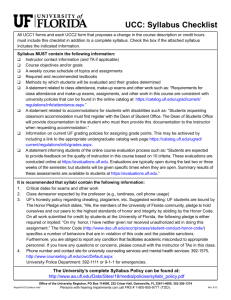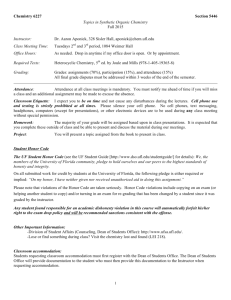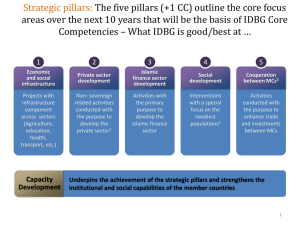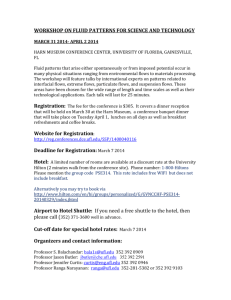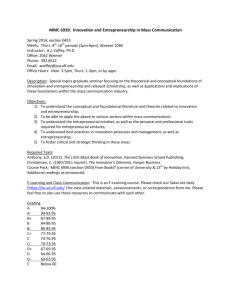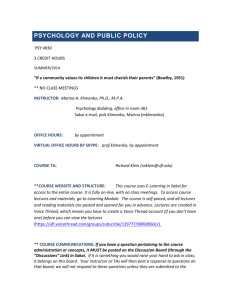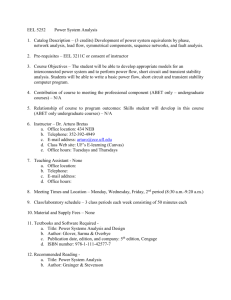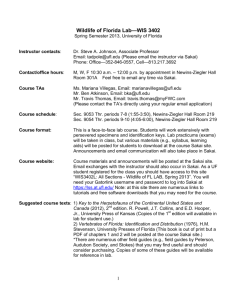HUM 2305: What is the Good Life? SUMMER 2014
advertisement
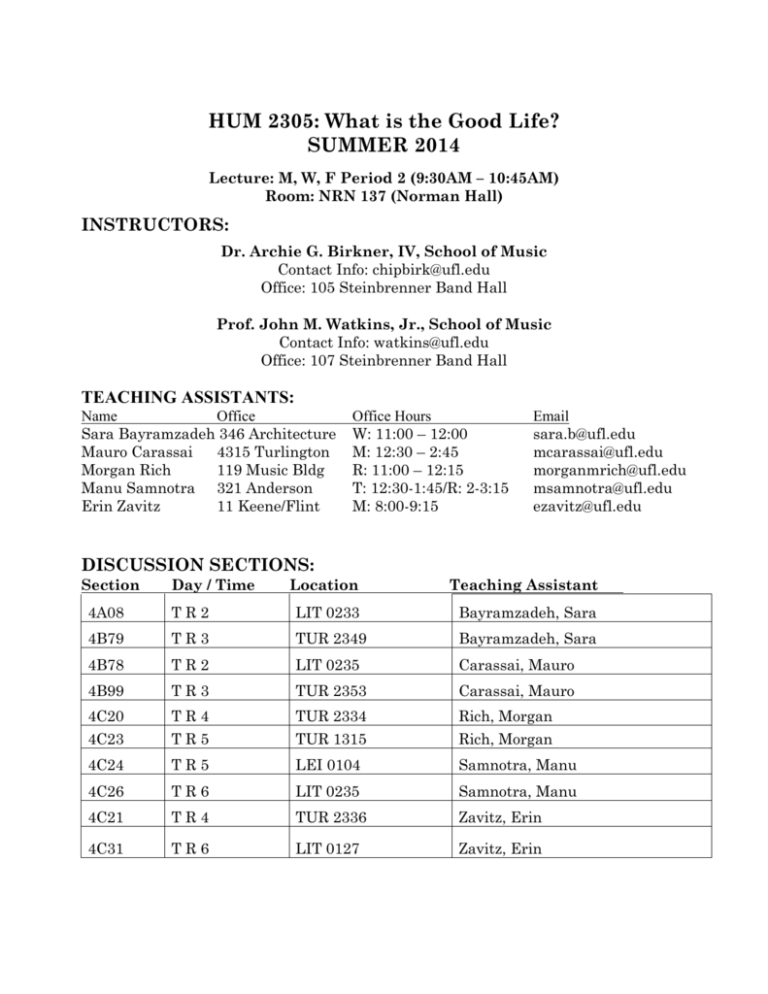
HUM 2305: What is the Good Life? SUMMER 2014 Lecture: M, W, F Period 2 (9:30AM – 10:45AM) Room: NRN 137 (Norman Hall) INSTRUCTORS: Dr. Archie G. Birkner, IV, School of Music Contact Info: chipbirk@ufl.edu Office: 105 Steinbrenner Band Hall Prof. John M. Watkins, Jr., School of Music Contact Info: watkins@ufl.edu Office: 107 Steinbrenner Band Hall TEACHING ASSISTANTS: Name Office Sara Bayramzadeh 346 Architecture Mauro Carassai 4315 Turlington Morgan Rich 119 Music Bldg Manu Samnotra 321 Anderson Erin Zavitz 11 Keene/Flint Office Hours W: 11:00 – 12:00 M: 12:30 – 2:45 R: 11:00 – 12:15 T: 12:30-1:45/R: 2-3:15 M: 8:00-9:15 Email sara.b@ufl.edu mcarassai@ufl.edu morganmrich@ufl.edu msamnotra@ufl.edu ezavitz@ufl.edu DISCUSSION SECTIONS: Section Day / Time Location Teaching Assistant 4A08 TR2 LIT 0233 Bayramzadeh, Sara 4B79 TR3 TUR 2349 Bayramzadeh, Sara 4B78 TR2 LIT 0235 Carassai, Mauro 4B99 TR3 TUR 2353 Carassai, Mauro 4C20 4C23 TR4 TR5 TUR 2334 TUR 1315 Rich, Morgan Rich, Morgan 4C24 TR5 LEI 0104 Samnotra, Manu 4C26 TR6 LIT 0235 Samnotra, Manu 4C21 TR4 TUR 2336 Zavitz, Erin 4C31 TR6 LIT 0127 Zavitz, Erin COURSE DESCRIPTION Drawing on the cluster of disciplines that make up the Humanities and the considerable resources at UF in support of the Humanities, this course inquires into the very nature and experience of being human. Applying multi-disciplinary and crosscultural approaches to explore the question “What is the good life?” Students consider the cost of the good life, examine how people have chosen to live as members of local and global communities, and analyze conceptions and expressions of beauty, power, love, and health. COURSE OBJECTIVES Students are provided instruction in multi-disciplinary approaches used in the humanities to study the good life through an analysis of juxtaposed works of art, architecture, history, literature, music, religion, and philosophy. • • • Content Objectives: Students will identify how different people from different societies across time conceptualize the good life, what meaning and value individuals ascribe to the lives that they live or want to live, and what are the choices, costs, and benefits of the good life. Communication Objectives: Students will communicate concepts, expressions, and representations of the good life clearly and effectively in written and oral form as stated in the rubrics of the course. Critical Thinking Objectives: Students will analyze the conflicts and tensions that arise between the individual and the community, the normative and the exceptional, culture and nature, needs and wants, pleasure and happiness, short-term benefits and long-term consequences of the pursuit of the good life. They will critically evaluate the costs and benefits of the good life in order to make sound decisions. COURSE FORMAT Elements common to all sections include the required “gateway” readings, the three common activities, and the course assignments. In addition, there are "pillar" readings assigned by the individual instructors. The faculty select pillars to complement the gateways, while also drawing on their own areas of interest and expertise to make the course a unique experience for the students in their sections. COMMON ACTIVITIES This course expects students to become actively engaged in experiences unique to UF. As such, course requirements include attending the Good Life Performance at the Phillips Center, seeing the Good Life exhibit at the Harn Museum, and watching the Common Lecture. More information on these activities can be found on the course Sakai site. COURSE WEB SITE • General Good Life course site at http://undergrad.aa.ufl.edu/hum-course.aspx • Course materials are available on Sakai at https://lss.at.ufl.edu/ THE UNIVERSITY HUMANITIES & GENERAL EDUCATION REQUIREMENTS Undergraduates are required to take HUM 2305, What is the Good Life, to fulfill 3 credits of the Humanities General Education Requirement. Additional information is available at • https://catalog.ufl.edu/ugrad/current/advising/info/general-educationrequirement.aspx • https://catalog.ufl.edu/ugrad/current/advising/info/general-educationrequirement.aspx TEXTS Required readings and materials for the course consist of two types: “Gateways” and “Pillars.” Gateways are common to all sections of HUM 2305 regardless of the instructor. Pillars have been chosen by the individual instructors. The following required readings are available in local bookstores and online retailers either as eBooks or paperbacks: • • • Top Hat Monocle Semester Subscription. ISBN: 9780986615108 Hermann Hesse, Siddhartha, translated by Joachim Neugroschel (New York: Penguin Books, 2002). ISBN: 978-0142437186. Sophocles’ Antigone, translated by Ruby Blondell (Newburyport, MA: Focus Publishing, 1998). ISBN: 978-0941051255. All other required readings and materials are in the Resources folder of the course’s Sakai webpage. ASSIGNMENTS AND REQUIREMENTS 1. A forty-five minute Midterm Exam in lecture on Friday, July 18 (150 points, 15% of the course grade) 2. An Essay (1,000-1,250 words) due 8:00 AM on Monday, July 28 via Sakai. Detailed instructions will be supplied prior to the due date. (200 points, 20% of course grade) 3. A Final Exam (cumulative) in lecture on Friday, August 8. (300 points, 30% of course grade) 3 5. 4 Quizzes (identification and/or multiple choice). Each quiz is worth 25 points. (100 points, 10% of course grade) 6. Discussion Activities. (130 points, 13% of course grade) a. Participation in weekly discussions. (30 points) b. Oral Presentation. (30 points) c. Sacred Space Postcard, due in lecture on Friday, August 1. (30 points) d. Essay Outline. (10 points) e. Common Activity Assignment. (30 points) 7. Attendance. (120 points, 12% of course grade) a. Lecture (50 points, one unexcused absence before and after the Midterm) b. Discussion Attendance. (50 points, one unexcused absence) c. Common Activities. (10 points for the Harn Tour, 10 points for the Good Life Performance) GRADING SCALE AND ASSIGNMENT SUMMARY Grade Proportion Grade Scale Grade Value Quizzes: 100 points (10%) Attendance: 120 points (12%) Activities: 130 points (13%) Mid-Term Exam: 150 points (15%) Essay: 200 points (20%) Final Exam: 300 points (30%) Total: 1,000 points (100%) 930-1,000 = A 900-929 = A870-899 = B+ 830-869 = B 790-829 = B750-789 = C+ 720-749 = C 690-719 = C660-689 = D+ 620-659 = D 600-619 = D0-599 = E A = 4.0 A- = 3.67 B+ = 3.33 B = 3.00 B- = 2.67 C+ = 2.33 C = 2.00 C- = 1.67 D+ = 1.33 D = 1.00 D- = 0.67 E = 0.00 https://catalog.ufl.edu/ugrad/current/regulations/info/grades.aspx *Please note: An earned grade of “C-” will not be a qualifying grade for major, minor, Gen. Ed., or basic distribution credit. 4 ACADEMIC HONESTY UF students are bound by The Honor Pledge, which states, “We, the members of the University of Florida community, pledge to hold ourselves and our peers to the highest standards of honor and integrity by abiding by the Honor Code. On all work submitted for credit by students at the University of Florida, the following pledge is either required or implied: “On my honor, I have neither given nor received unauthorized aid in doing this assignment.” The Honor Code. On all work submitted for credit by students at the University of Florida, the following pledge is either required or implied: “On my honor, I have neither given nor received unauthorized aid in doing this assignment.” The Honor Code specifies a number of behaviors that are in violation of this code and the possible sanctions. Furthermore, you are obligated to report any condition that facilitates academic misconduct to appropriate personnel. If you have any questions or concerns, please consult with the instructor or TAs in this class. STUDENTS WITH DISABILITIES Please do not hesitate to ask for accommodation for a documented disability. Students requesting classroom accommodation must first register with the Dean of Students Office (http://www.dso.ufl.edu/drc). The Dean of Students Office will provide documentation to the student, who must then provide this documentation to the Instructor when requesting accommodation. Please ask the instructor if you would like any assistance in this process. OTHER POLICIES, RULES, AND RESOURCES 1. Handing in Assignments: Assignments due in class should be handed directly to your TA. All other assignments must be submitted online through Sakai. 2. Attendance and Make-up Policy: Requirements for class attendance and make-up exams, assignments, and other work in this course are consistent with university policies that can be found in the online catalog at https://catalog.ufl.edu/ugrad/current/regulations/info/attendance.aspx • In the case of an absence due to participation in an official university activity, observance of a religious holiday, performance of a military duty, or any other university-approved absence (e.g., jury duty) which the student knows about in advance of the scheduled assignment, the student is expected to notify the instructor of the conflict before the assignment is due, and if possible at the start of the semester. • If a student does not hand in the Essay on time and an extension has not been granted, the Essay will be marked down 1/3 grade (e.g., from B+ to B) for each day it is late. • For all other assignments, the students will not be granted an extension or be permitted to make up the assignment without an acceptable reason, such 5 as an illness or serious family emergencies, in accordance with university policies on absences. 3. Grading Policy: If you have questions about your grade on an assignment, please make an appointment to meet with your TA within a week after the assignment has been returned so your TA can explain how you were graded. If after meeting with your TA, you wish to dispute your grade, you may email your instructor to request that the instructor re-grade the assignment. The instructor will then re-grade the assignment and the second grade will stand, regardless of whether it is higher or lower than the original grade. You may request regrading or dispute a grade up to one week after the assignment has been returned to you or the grade released. 4. Common Courtesy: Cell phones and other electronic devices must be set to vibrate mode during class. Students who receive or make calls or text messages during class will be asked to leave and marked absent for the day. The instructors may ask a student engaging in disruptive behavior, including but not limited to whispering or snoring, to leave the class, and the student will be marked absent for the day. 5. Counseling Resources: Resources available on-campus for students include the following: a. University Counseling and Wellness Center, 3190 Radio Rd, 392-1575; b. Student Health Care Center, 392-1161; c. Dean of Students Office, 202 Peabody Hall, 392-1261; 6. Course Evaluation: Students are expected to provide feedback on the quality of instruction in this course by completing online evaluations at evaluations.ufl.edu. Evaluations are typically open during the last two or three weeks of the semester, but students will be given specific times when they are open. Summary results of these assessments are available to students at https://evaluations.ufl.edu/results/.” 7. The Materials and Supplies fee for the course is $10.95. 6 WEEKLY SCHEDULE PART 1: THE INDIVIDUAL THINKING ABOUT THE GOOD LIFE (June 30-July 3) Gateways: 1. Vivien Sung, Five fold Happiness: Chinese concepts of luck, prosperity, longevity, happiness, and wealth. (San Francisco: Chronicle Books, 2002), 11-12; 18-19; 34, 49, 70-71; 94-95 and 97; 152, 156-157; 204-205; 207; 210-211, 214. 2. Dominik Wujastyk, ed., and trans. The Roots of Ayurveda (New York: Penguin, 2003), 61-70. 3. Herodotus, The History, translated by David Greene (Chicago: University of Chicago, 1987), I.29-33, 85-87 (on Solon and Croesus). 4. Dr. Melissa Lane, “Sustainable Citizenship”, delivered on January 27, 2014 in the Grand Ballroom of the Reitz Union, University of Florida, Gainesville, FL Pillars: 1. Randy Pausch, “Last Lecture – Achieving Your Childhood Dreams” http://www.youtube.com/watch?v=ji5_MqicxSo&feature=related SEEKING THE GOOD LIFE (July 7-9) Gateway: 1. Hermann Hesse, Siddhartha, translated by Joachim Neugroschel (New York: Penguin Books, 2002). Pillars: 1. Jyoti Thottam-Thimphu, “The Pursuit of Happiness”, Time Magazine, October 22, 2012, pages Business 1,2,4, 14 pdf (on Sakai) 2. Gretchen Rubin, “The Happiness Project”, (New York: Harper Collins, 2009), selected readings on Sakai. 7 EMBODYING THE GOOD LIFE (July 10-11) Gateways: 1. Interview and excerpt from Rebecca Skloot, The Immortal Life of Henrietta Lacks (New York: Crown, 2010). Available online at the National Public Radio website at the following address (37 minutes) 2. Emily Prager, “Our Barbies, Ourselves,” originally titled “Major Barbie” by Emily Prager. Originally appeared in the December 1991 issue of Interview. Pillars: 1.Oscar Wilde, “The Preface, Chapter 1, and Chapter 2” from The Picture of Dorian Gray (New York: Charterhouse Press, 1904), xiii-xv, 1044 (pages 24-71 in the digitized PDF found on Sakai). PART 2: SOCIETY SHARING THE GOOD LIFE (July 14-15) Pillars: 1. Song of Songs. 2. Plato, Symposium 210a-212b (Diotima's Ladder of Love). 3. Guido Guinizelli's Manifesto of Love. CELEBRATING THE GOOD LIFE (July 16-17) Gateways: 1. Brenda Smith and Ronald Burrichter, Multimedia Lecture. 2. Excerpt from “Bernstein in Vienna.” 3. Leonard Bernstein’s Video on “Ode to Joy.” 4. Abraham Joshua Heschel, “A Palace in Time,” Chapter One from his The Sabbath (New York: Farrar, Straus and Giroux, 2005), 12-25. Pillars: 1.Celebrating birthdays around the world: http://www.coolest-kid-birthdayparties.com/birthday-traditions.html 2. Celebrating New Year’s around the world: http://voices.yahoo.com/new-yearseve-customs-around-world-different-144186.html 8 Mid-Term Exam on Friday, July 18 in lecture GOVERNING THE GOOD LIFE (July 21-22) Gateways: 1. Declaration of the Rights of Man and of the Citizen. Pillars: 1. Louis Menand, “The Politics of Slavery” in The Metaphysical Club: A Story of Ideas in America (2001), 3-22. (On Sakai) 2. Ogochukwu Okpala, “Plato’s Republic vs. Democracy”, http://www.neumann.edu/academics/divisions/business/journal/review09/okpala.pdf 3. William Deresiewicz, “Solitude and Leadership” from The American Scholar, Spring 2010, Vol. 79, No. 2; 20-31. (On Sakai) FIGHTING FOR THE GOOD LIFE (July 23-25) Gateways: 1. Victoria Pagán, Multimedia Lecture on Antigone, Parts 1&2. 2. Sophocles’ Antigone, translated by Ruby Blondell (Newburyport, MA: Focus Publishing, 1998). 3. Martin Luther King, “Letter from a Birmingham Jail” (1963). 4. “Wo-Haw Between Two Worlds,” a drawing by Kiowa artist/warrior Wo-Haw, c. 1875. 5. Bessie Head, “The Prisoner Who Wore Glasses” in Under African Skies, edited by Charles R. Larson (New York: Farrar, Strauss, and Giroux, 1997), 169-176. Pillars: 1. Robert F. Worth, “How A Single Match Can Ignite A Revolution,” The New York Times Week In Review (New York January 23, 2011) http://www.nytimes.com/2011/01/23/weekinreview/23worth.html?_r=l&src=twrhp 2. Robert F. Kennedy’s ‘Eulogy for Martin Luther King’, Youtube. 9 PART 3: NATURE AND THE PHYSICAL ENVIRONMENT OWNING THE GOOD LIFE (July 28-29) Gateways: The Painted Desert a. Article by Geraldine Brooks b. Australian Exhibit Pillars: 1.VIDEO: Michael Sandel, “What Money Can’t Buy,” June 2012. https://www.youtube.com/watch?v=GvDpYHyBlgc 2. Dave Ramsey, “Three Things I Wish I Knew Before College”; “6 Things Every College Freshman Needs.” Essay due 8:00 AM on Monday, July 28 10 via Sakai CONSTRUCTING THE GOOD LIFE (July 30-31) Gateways: 1. Margaret Carr, Multimedia Lecture. 2. Sacred Space Postcard Assignment (available in the Resources folder of Sakai) due in lecture on Friday, August 1. Pillars: 1. Charles Jenks, “The Architecture of Hope” from The Architecture of Hope (London: Frances Lincoln Limited, 2010), 11-43. SUSTAINING THE GOOD LIFE (August 1) Gateways: 1. Aldo Leopold, “The Land Ethic,” from A Sand County Almanac and Sketches Here and There (New York: Oxford University Press, 1948), 201-226. 10 Pillars: 1.Sherry Ackerman, “The Good Life: How To Create A Sustainable and Fulfilling Lifestyle,” http://postconsumersociety.blogspot.com/ 2.The Boy Scout Outdoor Code, http://www.scouting.org/scoutsource/OutdoorProgram/OutdoorEthics/OutdoorCode. aspx Sacred Space Postcard due in lecture on Friday, August 1 PART 4: EPILOGUE (AFTER THE GOOD LIFE) QUESTIONING THE GOOD LIFE (August 4-5) Gateway: 1. Henry Thoreau, “Where I Lived, and What I Lived For” and “Conclusion,” from Walden. Pillars: 1. Charles Ives, “Thoreau” from Essays Before A Sonata, (New York: W.W. Norton, 1969); 51-69. PERPETUATING THE GOOD LIFE (August 6-7) Gateway: 1. Chapter Two of Barbara Stoler Miller, trans. The Bhagavad-Gita: Krishna's Counsel in Time of War (New York: Bantam Classics, 1986), 31-41. Pillars: 1. E. B. White, “Once More to the Lake” in Essays of E.B. White, (New York: Harper, 1977); 246-253. Final Exam (cumulative) on Friday, August 8 in Lecture 11

